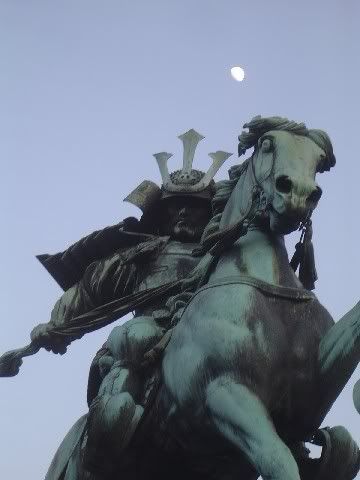29. Zaijian (Until we meet again)
After a few days, I was finally on the bus to
I passed through border control and went to the international check-in desk behind a set of partition walls, separating the domestic and international areas in the open-plan hanger. I was covered in sweat from walking to the bus and thought a change of shirt would be considerate for the others on the plane and, having packed all my other clothes, went scouring the few duty free shops. Nothing in the shops was affordable, so I was stuck in the t-shirt I had on. I went to one of the two restaurants for something to eat to pass an hour and then was on my way to
I researched how to get to the camp on the internet and after buying a camera for my mother in the city, headed north via the MRT. The trains venture underground from the central city and emerge to open ground as the rails are elevated above ground level at the outer areas of the island. What I could see of northern
From the MRT station, I had to find a back road to get to the camp situated off the busy
A big black dog appeared from one of the numerous agricultural centres and was instantly interested in me, following at a trotting pace. With no footpath to walk on, I had to walk near the deep grass drains on the side of the road, despite concern for snakes and also had to consider the dog. As I rounded a bend, I saw a junction with a busy road in the distance so sprinted a good hundred metres, still watching for snakes. I slowed to look back at the dog, which rounded the bend sprinting too. I hit top gear again, reached Sembawang Road a moment later, and kept going until I was on the other side of the six-lane highway. The dog stopped on his side of the road, levelling an angry bark at me instead of crossing the lanes.
I took a deep breath and headed north, where I found the gates of another military facility called Dieppe Barracks. My mother had suggested I look around in there too, as there were family facilities, such as a recreation hall, that New Zealand Army families had used there. However, the six-foot high fences and gates were draped in barbed wire and the polite young man carrying the fully automatic MP5 rifle was unable to let me in.
I offered him my passport, my camera and joked that I’d allow him to strip and cavity search me. He laughed and said no.
He said Nee Soon Camp wouldn’t let me in either, as I needed a permit attainable from my embassy, but I’d need to be on official business to attain that. My mother had been allowed into the camp to see our old house during the nineties, but security had probably tightened since she’d been there, maybe due to the war on terrorism. I thanked him for his time and continued north.
Nee Soon is now a large array of apartment complexes, a contrast to twenty years earlier when it was a smattering of tin shacks. I arrived after only a few minutes walk up the road and followed the signs towards the MRT station.
At a shop by the station, the shopkeeper said she was going to
I headed west via the MRT to the War Memorial from World War Two. When I lived there, the armed forces would go there for ANZAC day commemorations. The sun was glaring down on me as I walked amongst the headstones of Australians and Indians who served and died in the area. There were a few
I spent the next day looking around
With my face and neck still sunburnt from the outing to Nee Soon and the Memorial, I was at
The call was made to board, and once we were in the air, it sunk in that I was on my way home. I had reflected often about the trip, to the many people I’d offered advice to in
The first glaringly obvious thing I concluded was that the issues I had in life at home were issues I dealt with daily in
I saw many things in
Seeing the little girl singing and dancing at the train station in Ling Xi was a life-changing event for me. As I watched her, I snapped out of my anger and hate and saw her humanity. She made it alright for me to care about others, whether I could help them or not, and dished out a lesson that circumstances don’t actually effect whether people enjoy life or not. Her example is something I will always aspire to.
It was a message I’d been sent on numerous occasions. A few days after Ling Xi, I’d been walking through the People’s Square in
That message has finally been received. I took out my diary and wrote my final entry, which said:
“If I ever feel like I’m popping balloons on a raging bull’s horns, I will think of that little girl in Ling Xi singing and dancing, and will charge into the arena smiling.”
The flight arrived the next morning to a cold and crisp
“Did you enjoy yourself?” she asked.


0 Comments:
Post a Comment
<< Home